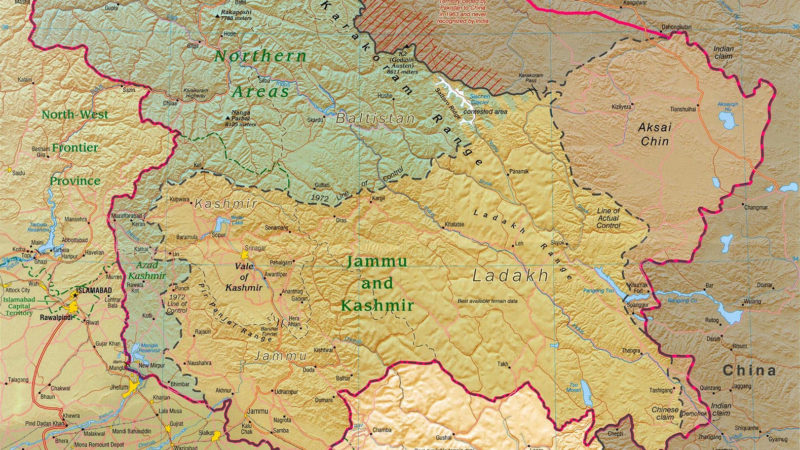
There are many pressing issues due to be debated at the Labour Party conference, its fringe events and The World Transformed over the next week. From Brexit to the climate crisis, there is an energy in the work of many grassroots Labour activists, who are building movements borne out of our political crises. Over the past few weeks, we’ve seen protests such as #StoptheCoup, organised by Another Europe is Possible, taking to the streets across the country to stand up for democracy.
But we’ve also seen another urgent protest movement gain traction across the country, attracting large numbers of British women and girls, many first-time protestors, to make their voices heard. In Reading last Saturday, 1,000 people protested for Kashmir, with women leading from the front. This protest movement is rooted in Britain’s history and colonial legacy in the subcontinent. It is rooted in the heritage and human rights or British workers and their families who helped build Britain and helped Britain accumulate its wealth.
Kashmiri workers, like many working-class minorities including my father, uncles, mother and aunts, provided the labour to rebuild Britain. This is why Kashmir for the Labour Party must be much more than just a foreign policy issue in Brexit Britain where unfortunately trade deals and arms sales trump international law and human rights.
At Labour conference in Brighton, Kashmir will be discussed via a motion submitted by Blackburn, Dudley North, Keighley, Stockport and Wakefield CLPs. There is a human rights and humanitarian crisis unfolding in Kashmir, which is why this motion should be put on conference’s priories ballot. Kashmir has been under curfew, siege, and occupation by the government of India since early August, with a communications blackout in place. More than seven million Kashmiris remain cut off from the outside world, including their devastated families and friends.
More than 4,000 men have been arrested with no due process, many taken from their homes by the Indian military. Hospitals face catastrophic medicine shortages; patients are unable to get to hospitals and clinics due to curfews and the heavy militarisation of the region. Journalists facing aggression, hostility and censorship have managed to report from inside Kashmir. Their reports document enforced disappearances and accusations of torture by Indian security forces. A civilian population are existing in terror, with their elected political leaders under house arrest or being held in prison incommunicado with no access to the law or the justice system. Women report being threatened with rape and sexual violence, and living in fear of both.
The motion on Kashmir due to be discussed at conference condemns the recent actions of the government of India to revoke article 370 and 35A of the Indian constitution and the special status granted to Indian occupied Kashmir. Crucially, it calls on the Labour Party, the government in waiting, to clearly and vocally support the Kashmiri people’s right to self-determination and for international observers to be sent to the region immediately. Neither India nor Pakistan has the right to dictate or determine Kashmiri people’s rights to decide their future. Instead, they need to be involved in diplomatic dialogue to resolve the unfolding crisis, which also threatens to further damage relations between India and Pakistan.
The Kashmir conference motion also calls on British companies to stop the supply of arms that could be used against the civilian population under occupation in Kashmir. This echoes the demands that have been made over the war in Yemen. Earlier this month, Britain along with the USA and France was accused by the UN of being possibly complicit in war crimes in Yemen. The UN says Britain and the rest could be culpable of war crimes due to arms sales, intelligence and logistics support to the Saudi-led coalition, which is accused of starving civilians as a tactic of war.
UN investigators have said all states should impose a ban on selling weapons to prevent actors in the conflict carrying out killings and human rights violations against people. In a landmark ruling in June, the court of appeal ruled UK arms sales to Saudi Arabia were illegal because they could be used in violation of international law in the conflict in Yemen. This week, it was revealed the government has breached the court order twice and there are calls for the International Trade Secretary, Liz Truss, to resign.
Labour’s response to the future of Kashmir, the rights of an occupied people to self-determination in the face of massive militarised aggression, and the flouting of international law over many decades, is a test for the party and the wider labour movement’s commitment to internationalism. We must take this opportunity to stand up for the rights of Kashmiris.
Shaista Aziz will be talking about Kashmir at The World Transformed’s Fighting Global Fascism event on Saturday 21st September.




More from LabourList
‘Hope starts young: Why Labour must tell the story of a better tomorrow’
LGBT+ Labour suspends AGM amid fears of legal action over trans candidates running for women’s roles
‘Hyperlocal messaging can help Labour win elections: Here’s how’